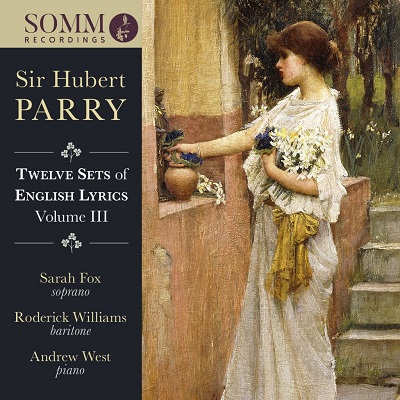By extension this also serves to highlight Parry's unique role in British music history. Britain has strong literary traditions : composers like Purcell worked with playwrights like Dryden. British audiences were receptive to Handel because he wrote for the theatre. His oratorios, like Mendelssohn's, connected to the role of music in British religious culture. Hence the predilection for vocal music and for choral music in particular. British music is music for voice, either declaimed or sung. The situation isn't dissimilar to France or Italy where sacred music and opera dominated, and even in Germany and Austria, symphonic music in the modern sense didn't take root until the 18th century. So much for the myth of Das Land ohne Musik !
Because Parry's songs specifically address English art poetry, they mark a departure into new territory which would later be developed by composers like Vaughan Williams and others who sought out folk tradition and by by composers like Finzi, who addressed Tudor, Stuart and Restoration poetry. Notice Parry's term “English Lyrics”, focusing on English as a language. Parry's outlook was progressive, alert to contemporary European influences, which is no demerit, given the extremely high quality of 19th century Austro-German music. Effectively, he was the father of modern British music. Please read more here about Volume I in this series (settings of Shakespeare and 17th and 18th century poets) and about Volume II (where Parry sets poets of the 19th century, close to his own time, not unlike the way that Schubert, Schumann and others set Goethe and Heine.
My heart is like a singing bird dates from 1909, and was written for the soprano Agnes Hamilton Harty, (wife of the pianist Hamilton Harty). The lines fly and soar - like a songbird - and Sarah Fox's clear, lyrical singing does it justice. The text is Christina Rossetti's A Birthday. Extending the imagery, The Blackbird, If I might ride on puissant wing and A Moment of Farewell. The first is relatively straightforward but its very simplicity evokes the folk song adaptations that became popular in the Edwardian period. A Moment of Farewell, (to a poem by John Sturgis) however is more sophisticated with an elaborate, rolling piano line, (pianist Andrew West) evoking the “buoyant emotion” of a “bird flying far to the ocean”. With The Sound of Hidden Music, Parry is writing art song as fine as any German composer’s. The piano introduction flows elegantly, almost caressing Sarah Fox's lines. Although the poem, not specially adept, is by Julia Chatterton, unknown today, Parry's response lifts it well above the ordinary. The memory of “things of life that touch the heart are things we cannot see” warm the spirit in winter. It was signed on his 70th final birthday in 1918, inscribed with the words “Slowly and with deep feeling”. This was to be his last birthday, and final completed song. There is some evidence that he did not think he would live out the year, and indeed, he died some months later.
Just as Schubert set poems by people he knew, Parry chose poems by friends who meant a lot to him, which tells us much of his humane and caring personality. Nine of his seventy-four English Lyrics (eight included in this collection) are settings of John Sturgis, Parry's classmate at Eton and fellow student at Oxford. Like Parry himself, Sturgis was able to switch to art from business. Through the Ivory Gate describes a vision of a dead boyhood companion. “No friendship dies with death”, sings Roderick Williams, whose style of direct communication makes the song feel personal. A Stray Nymph of Dian, another Sturgis setting, describes a Grecian nymph, and draws from Parry a more declamatory approach. A Girl to her Glass is flirtatious, while Looking Backward is not melancholy - not a Parry characteristic - but thoughtful. Grapes is boisterous, as befits a paean to Bacchus. “Grapes, grapes, grapes beyond all measure!” sings Williams with good humour.
Alfred Perceval Graves, an Inspector of Schools, was well known in Victorian times. “I am weaving sweet violets, sweet white violets” sings Williams in A Lover's Garland. Parry's setting is elegant, reflecting the classical reference to “Heliodora's brow”. At the Hour the Long days Ends in lesser hands than Parry's might have veered close to parlour song, but he treats it with dignity. Graves's poem The Spirit of the Spring, with its references to Taunton town and archaic words like “maund” (a unit of weight) is quaint in an artificial way - he was no Housman or Hardy - but Parry, like Schubert, could elevate less than ideal verse with good musical setting.
The rather better poetry of Langdon Elwyn Mitchell inspired Parry to greater heights. Nightfall in Winter captures a sense of enveloping darkness. The piano plays single notes in succession, suggesting the steady coming of night, cold and frost. “The clouds obscure the sky with gloom”, sings Williams, his voice rising upwards for a moment before settling back into somnolent mood. Mitchell also wrote the text for From a City Window, one of Parry's best-known English lyrics. “I hear the feet below”, sings Sarah Fox, as West plays the bustling piano part, “(which) go on errands bitter or sweet whither I cannot know”. A long pause, for rumination before the second verse, “A bird troubles the night” evoking “vague memories of delight”. Another, shorter, pause before the final strophe “And the hurrying, restless feet below, on errands I cannot now, like a great tide ebb and flow”. A strikingly modern song, with its urban context and sense of unknown possibilities, the bird a symbol of longing yet disquiet. Although Parry's Twelve Sets of English Lyrics have been recorded before in various forms, this series from SOMM is a landmark because it presents the complete collection, together with good notes and good performances, establishing Parry's role as the pioneer of modern English song.
Anne Ozorio
